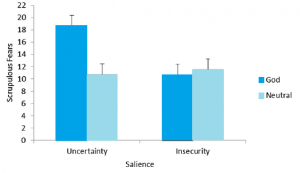Religious people often seem to have strong taboos. Think of any religion, and there is usually some proscribed activities or objects, and an emphasis on purity. Maybe religion is connected to a heightened sense of disgust?
Uri Berger and David Anaki, at Bar-Ilan University in Israel, were looking to see how one questionnaire often used to measure disgust, the Revised Disgust Scale (DS-R) functioned across a diverse group of Israeli citizens. Most studies in the past have used students (and mostly women), but the 1427 participants in their study had an average age of 33, and only half were women.
The DS-R has 27 questions and, like others, Berger and Anaki found that they fell into three groups of closely related questions.
- Core disgust: related to disease and eating
- Animal reminder: related to sex, death, and hygiene
- Contamination: related to, well, contamination
Overall they found that religion doesn’t really explain why some people are more easily disgusted than others. It only explained 1.4% of the variation – gender was ten times more important (women were more easily disgusted than men).
What was interesting is the relationship between religion and different types of disgust. Religious people were actually less disgusted by contamination than the non-religious, and only a bit more disgusted by ‘core disgust’.
But this was more than made up for by the disgust felt by the religious over reminders of our animal nature.
So it could be that religion changes the things that disgust us. Certainly it seems to affect the broad domains of disgust, but there’s probably more to it than that. As Berger and Anaki comment:
[It] may be that demographic elements do not modulate levels of disgust per se as much as they impact the context in which disgust is activated. For example, the dietary differences in Jewish and Hindi religions caused the variation in subjective disgust evoked in devotee’s response to a potential consumption of ‘‘forbidden animals’’; Jews who consume beef are repelled from pork consumption, while the vice versa applies for non-vegetarian Hindus. However, the level of religious devoutness may only slightly modulate the intensity of that subjective disgust.
![]()
Berger, U., &Anaki;, D. (2014). Demographic influences on disgust: Evidence from a heterogeneous sample Personality and Individual Differences, 64, 67-71 DOI: 10.1016/j.paid.2014.02.016
 This article by Tom Rees was first published on Epiphenom. It is licensed under Creative Commons.
This article by Tom Rees was first published on Epiphenom. It is licensed under Creative Commons.













